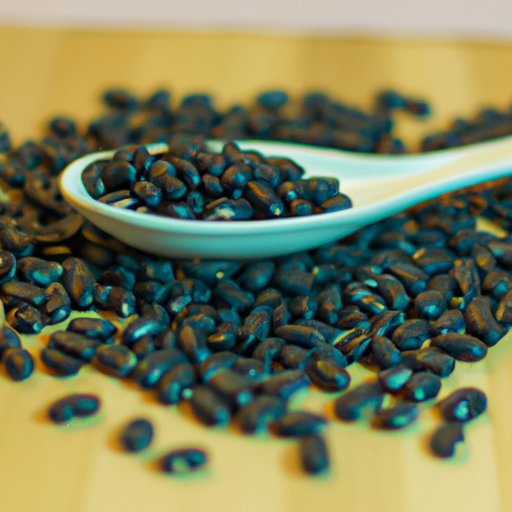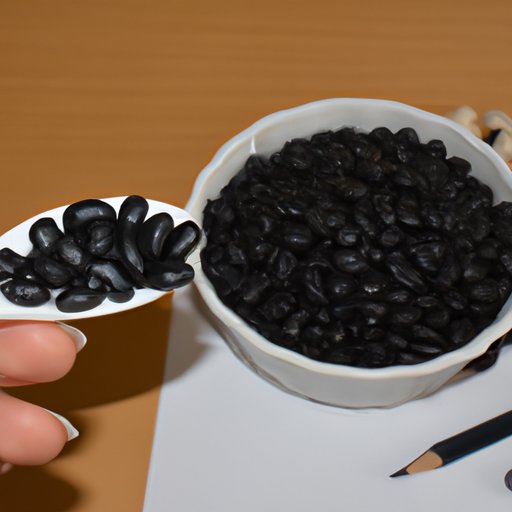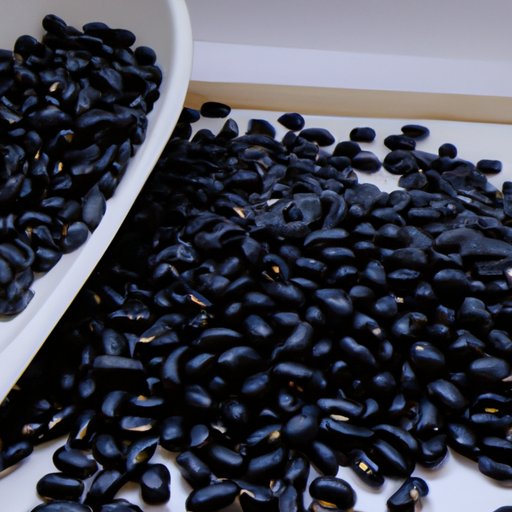Introduction
Black beans are a popular legume that are often used in Latin American cuisine. They are small, oval-shaped beans with a glossy black surface and an earthy flavor. Rich in protein, fiber, and vitamins, black beans are a nutritious addition to any diet. In this article, we’ll take an in-depth look at the health benefits of black beans and explore ways to incorporate them into your meals.
A Nutritionist’s Guide to Eating Black Beans
When it comes to eating black beans, it’s important to understand serving size and daily intake. According to the United States Department of Agriculture (USDA), one serving of cooked black beans is equal to ½ cup or 78 grams. The USDA recommends consuming 2 to 3 servings of cooked black beans per day as part of a balanced diet.
Incorporating black beans into your diet is easy. You can add them to salads, soups, stews, tacos, and burritos. You can also mix them with grains like quinoa and rice, or use them as a base for veggie burgers. You can even make black bean brownies or use them in smoothies. There are countless delicious ways to enjoy black beans.

The Health Benefits of Adding Black Beans to Your Diet
Black beans are a great source of nutrition. They are low in fat, contain no cholesterol, and are high in protein, fiber, and complex carbohydrates. They are also an excellent source of vitamins and minerals like folate, magnesium, phosphorus, and manganese. Let’s take a closer look at the health benefits of eating black beans.

Exploring the Nutritional Value of Black Beans
Black beans are an excellent source of plant-based protein. One cup of cooked black beans contains 15 grams of protein, which is about 30 percent of the recommended daily intake for adults. Protein is essential for building and repairing muscles, supporting immune function, and maintaining healthy skin and nails.
Black beans are also a good source of dietary fiber. A single cup of cooked black beans contains 15 grams of dietary fiber, which is 60 percent of the recommended daily intake. Fiber is important for digestion and helps to keep you feeling full longer. It can also help to lower cholesterol levels and regulate blood sugar levels.
In addition to protein and fiber, black beans also contain a variety of vitamins and minerals. These include folate, magnesium, phosphorus, iron, and manganese. Folate is important for cell growth and development, while magnesium helps to maintain healthy bones and regulate blood pressure. Phosphorus plays a role in energy production and iron helps to transport oxygen throughout the body. Manganese is important for metabolism and bone development.
Impact on Blood Sugar Levels and Diabetes
Black beans are a great choice for people with diabetes. Studies have shown that consuming black beans can help to regulate blood sugar levels and reduce the risk of diabetes and heart disease. This is due to their low glycemic index, which means they are slowly digested and absorbed by the body. This helps to prevent spikes in blood sugar levels.
According to a study published in the journal Nutrition, “Consumption of black beans has been associated with improved glycemia and lipid profiles, which could be beneficial for prevention and management of type 2 diabetes.” The study concluded that black beans could be a useful addition to the diets of people with diabetes.
Other Potential Health Benefits
In addition to regulating blood sugar levels, black beans may offer other health benefits. Studies have shown that they may help to reduce inflammation, boost heart health, and improve digestive health. They may also help to fight fatigue and support weight loss.
A study published in the Journal of Food Science and Technology found that black beans contain compounds called polyphenols, which have antioxidant and anti-inflammatory properties. The study concluded that these compounds may help to reduce inflammation and protect against chronic diseases.

Cooking With Black Beans: Healthy Recipes for Every Meal
Now that we’ve explored the health benefits of black beans, let’s look at some delicious recipes that incorporate them. Here are some tasty ideas for breakfast, lunch, dinner, and snacks.
Breakfast Recipes
Start your day off right with a nutritious breakfast. Try making black bean breakfast tacos with scrambled eggs, avocado, salsa, and cheese. Or whip up a batch of black bean pancakes with whole wheat flour, mashed black beans, and spices.
Lunch Recipes
For lunch, try a black bean and quinoa salad with fresh vegetables and a flavorful vinaigrette. Or make a hearty black bean soup with onion, garlic, tomatoes, and spices. Serve with a side of crusty bread or crackers.
Dinner Recipes
For dinner, try a Mexican-inspired dish like black bean enchiladas with roasted vegetables and melted cheese. Or make a vegetarian burrito bowl with black beans, brown rice, guacamole, and salsa.
Snack Recipes
Black beans also make a great snack. Try roasting them in the oven with olive oil, salt, and pepper. Or blend them into a dip with garlic, cilantro, and lime juice. Serve with crunchy vegetables or tortilla chips.
Shopping Smart: Finding Quality Sources of Black Beans
It’s important to find quality sources of black beans. Look for brands that are certified organic and non-GMO. Organic black beans are grown without the use of synthetic fertilizers, pesticides, or herbicides. Non-GMO black beans are not genetically modified.
You can also look for locally sourced black beans. Many farmers markets or specialty stores carry local varieties of black beans. Buying local supports local farmers and helps to reduce your carbon footprint.
Conclusion
Black beans are an incredibly nutritious legume that offer a variety of health benefits. They are a great source of protein, fiber, and vitamins and minerals, and may help to regulate blood sugar levels and reduce the risk of diabetes. They are also easy to incorporate into your diet, and can be enjoyed in a variety of delicious recipes. When shopping for black beans, look for brands that are certified organic and non-GMO.
For more information about the health benefits of black beans, check out the following resources:
- Harvard T.H. Chan School of Public Health: “Food Features: Black Beans”
- National Center for Biotechnology Information: “Health Benefits of Black Beans”
- WebMD: “Health Benefits of Black Beans”
Black beans are a nutritious and delicious addition to any diet. With their high protein, fiber, and vitamin content, they are a great way to get essential nutrients into your meals.
(Note: Is this article not meeting your expectations? Do you have knowledge or insights to share? Unlock new opportunities and expand your reach by joining our authors team. Click Registration to join us and share your expertise with our readers.)
